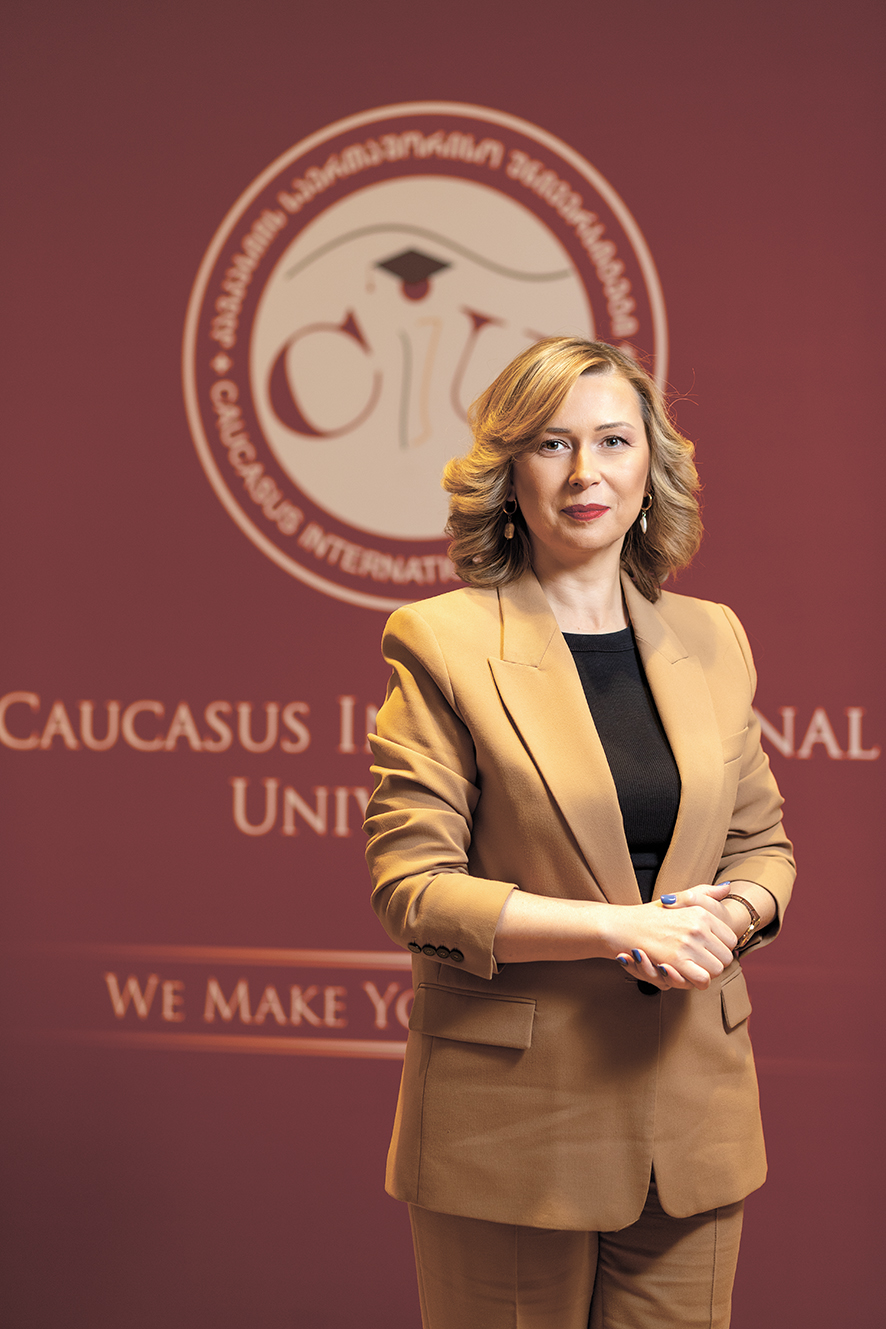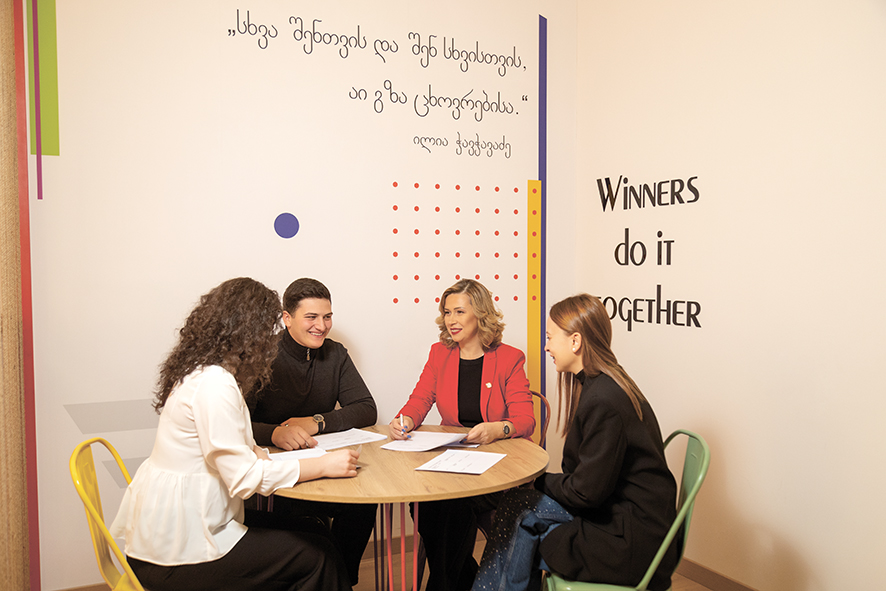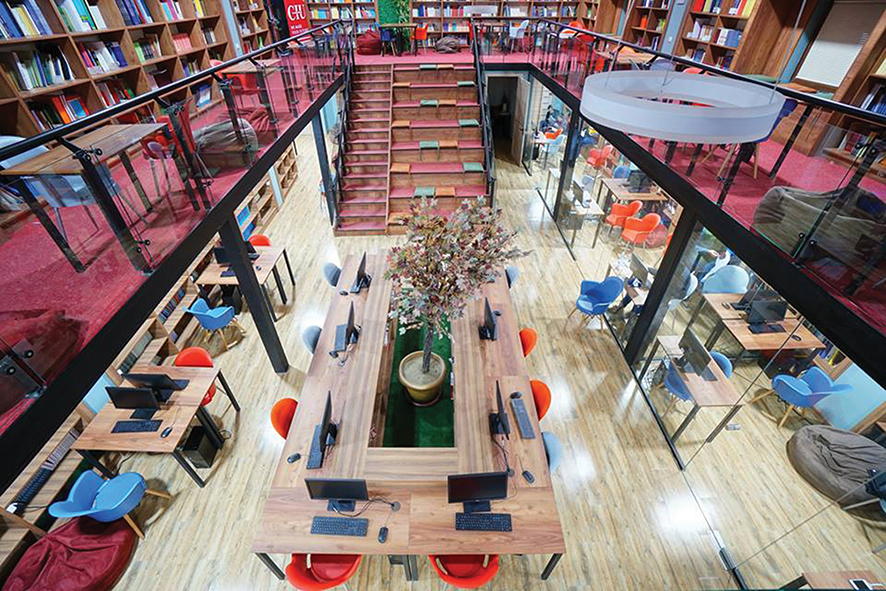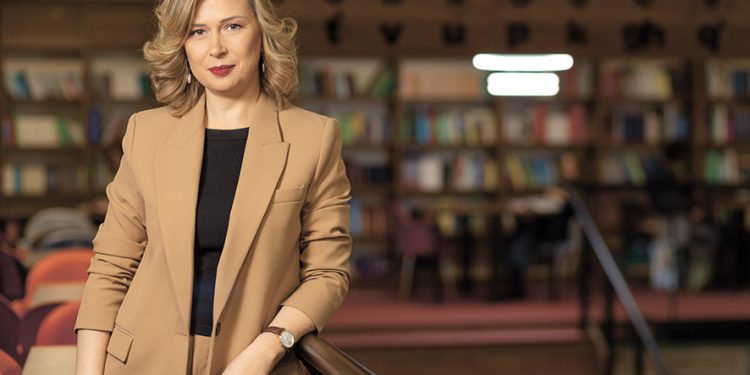Caucasus International University (CIU) was established 28 years ago, and since has travelled a long and exciting path of development. Back in 1995, CIU was represented by only one faculty- that of Medicine, and today it unites five different faculties at the bachelor’s, master’s, and doctoral levels – of Business and Technology, Social Sciences and Humanities, Law, Medicine, and Viticulture and Winemaking. In addition, the university boasts its own entrepreneurial base, vineyards, winemaking facilities and various research opportunities.
Caucasus International University has implemented several exciting projects in entrepreneurship. Five years ago, a Business Incubator was established within the university to help students transform their ideas into businesses. It soon became clear how vital entrepreneurship is to students, so the Faculty of Business and Technology at CIU set out a plan to implement an innovative Entrepreneurship-Based Learning Model.
Entrepreneur sat down with Marika Klidiashvili, Dean of the Faculty of Business and Technology, to find out more about what that learning model entails, and what kind of activities and opportunities Caucasus International University offers its students.
Marika Klidiashvili has 24 years’ experience in business and technology. She joined the university’s academic activities seven years ago, and has held the position of dean for almost a year. Marika was one of the first female programmers in Georgia, worked in the banking industry for 15 years, and participated in several innovative projects, within the framework of which the first internet bank, mobile bank, and other exciting platforms were created. In addition, she has led projects, IT business analytics, and information systems departments in Georgian and international companies. Then she became the director of operations and innovations in technology and education. Ten years ago, she focused her career on developing small and medium-sized businesses, and to this day, she is involved in business acceleration programs in various positions, leads multiple projects, and is a change management expert, international project manager, and professional coach.
“I have a strong emotional bond with Caucasus International University. Seven years ago, I was invited to the university as a consultant and expert. At that time, the university team was working on a 7-year strategic development plan, and I was involved in this process from beginning to end. It was very gratifying for me to see the implementation of the jointly developed plan. Not only was all that was planned carried out, but much more besides. It was exciting for me to see how well the university developed, and to contribute to that development,” Marika says.

The Faculty of Business and Technology
Currently, the Faculty of Business and Technology offers both Georgian and English language programs- bachelor’s, master’s, and doctoral degrees in Finance, Management, Marketing, Tourism, Business Administration, and Information Technology. The university offers students a practice-based education, and facilitates connections to potential employers in the public and private sectors by organizing training sessions, lectures, and seminars relating to various industries. The university takes special pride in honoring high-achieving students, and offers them scholarships and additional funding programs.
It is strategically important for all programs at the faculty to support entrepreneurship and integrate the entrepreneurship component into all their activities, be they scientific or research processes.
As Marika points out, the faculty offers students a comprehensive list of partner companies for employment, and those who have their business ideas are given the opportunity to engage in entrepreneurial activities and participate in various projects of their interest.
Caucasus International University has a career coaching and mentoring program, where students are assisted in forming a vision for career development. With consistent and diverse approaches, the mentioned program allows students to discover and understand their career aspirations, make informed decisions, and set professional goals.
“The students need to see what possibilities lie ahead. We are here to show them the whole spectrum, and then help them to navigate and figure out what they want. If a student decides that they are interested in business and want to become an entrepreneur, we offer them a range of opportunities,” says Marika.

Practical Entrepreneurship Opportunities at CIU
The business incubator is one of Caucasus International University’s more advanced projects. The six-month program helps students work on different business ideas based on their experiences, interests, and desires. Currently, the project is running for the fifth time, and along with developing entrepreneurial skills, the university believes it also boosts creativity. The final part of the project is a demonstration day, where students present their business ideas to guests and potential investors.
“It’s not our primary goal in itself that students are funded within the framework of this idea; our KPI is that they acquire skills and learn entrepreneurship. They may tweak the idea or the team in the future, but, most importantly, they will have the skills and knowledge to apply and bring their ideas to life. We are going to open the incubator’s doors to students and young entrepreneurs who want to participate in such a program, but who are unable to do so for whatever reason,” Marika says.
Through the business incubator, the university is building a collection of real-life cases of Georgian entrepreneurs, which are then shared with other educational institutions to develop a quality curriculum for the methodological teaching of entrepreneurship. Work on the project began this year, and the first version of the collection will be published around the fall of 2024. The collection will combine the stories of individual companies, particularly the development path of each company, mistakes they made in the process (and how these could have been avoided), as well as the reasons for their success. The university’s academic staff is actively involved in the process, along with the students.
“It is crucial to study international cases, but it is also important to have real-time Georgian cases. Our country has accumulated enough experience to share and learn from. I was a mentor of business incubator startups in Technopark for three years, and I remember the first steps and challenges faced by many. Plenty of interesting cases could be gathered to enrich the current learning materials. We will gladly collaborate if other universities are willing to join us in this initiative,” Marika notes.
She adds that partnerships and joint actions are essential for the development of the industry. For her, Caucasus International University is a platform for collaboration – “Our task is not only to teach entrepreneurship, but to be participants in the process of entrepreneurship development in the country.”
The Faculty of Business and Technology of Caucasus International University, through its activities, contributes to implementing sustainable development goals and improving the economic environment. It is essential that the university, together with partner organizations, promotes the initiation, expansion, and development of micro, small, and medium-sized businesses. For this purpose, a “Business and Entrepreneurship Clinic” was created at the university, which on the one hand helps entrepreneurs to overcome various challenges, and on the other allows students to observe the consulting process in a real environment.
The entrepreneurs coming to the business clinic are met by a commission of the academic council of the faculty. With joint efforts, they look at the challenges and develop an action plan. Students observe this process, and after the consultation meeting, they discuss how the meeting was conducted, analyze the case, and review the solutions. The students’ engagement makes the learning process even more interesting and motivates them to be more proactive.
To engage in sustainable development goals and celebrate the 30-year partnership between the United Nations and UN-Georgia, the “Laboratory of Sustainable Development Goals” was opened at Caucasus International University.
This year, Caucasus International University joined the UN Global Compact Network Georgia initiative and has already implemented several exciting projects, including the “Green Economy Ambassadors” project, which seeks to raise awareness about the sensible use of natural resources, reduce negative environmental impacts, and promote “green” skills among youth. Within the frames of the program, the “Green Economy and Sustainable Development Week” was held, uniting various events.

CIU constantly implements different types of initiatives and, most importantly, participates in international programs. In November, the university hosted an event planned within the frames of the “Global Entrepreneurship Week 2023 / GEW”.
GEW is an international campaign to promote and encourage the development of the entrepreneurial ecosystem. Every year since 2008, about 200 countries have taken part in GEW. Caucasus International University represents Georgia at the event, where various trainings and public lectures are held throughout the week. An exhibition and sale of the faculty’s partner entrepreneurs’ products and services was organized at the closing event. Successful cases were shared with students, panel discussions were held, and current needs in the field were discussed. Entrepreneurs as well as academic staff and invited guests – representatives of the partner associations, in particular “The Retail Trade Association,” “The Small and Medium Business Development Association,” “The Electronic Commerce Association,” “And the United Nations Global Compact Georgia Network,” were engaged in the discussion. The discussion panel led to the generation of new ideas and initiatives that the faculty and its partners will present to the public in the near future.
As the Dean of the Faculty of Business and Technology notes, today, business does not exist without technology, and vice versa. The two concepts are so intertwined and significant that the teaching process has to be altered to incorporate this concept. The faculty plans to open e-commerce and fintech (finance and technology) laboratories in the spring of 2024 within the cooperation framework with partner associations.
Scientific Entrepreneurship Opportunities at CIU
Students who want to gain experience in the scientific field can participate in various research projects in entrepreneurship or related fields. The university also has several partner companies in the scientific direction.
In the spring of 2023, the five-week research project “Business Studies in Support of Sustainable Development” was implemented at Caucasus International University. Faculty students who participated in the project were mentored by Faculty of Business and Technology representatives and partner organizations, including the SMEDA Association, the United Nations Food and Agriculture Organization (FAO), and the Georgian Distributors Association.
The central theme of the study was “Problems and Challenges of Food Waste Management in Supply Chains.” Along with the primary goal, it was essential to encourage and support young scientists.
The research project participants had six trainings and field trips to the “Natakhtari” enterprise. In addition, they went through a mentoring process, worked with 15 different restaurants, hotels, distribution, and retail companies, obtained the required information, and conducted interviews with senior-level managers.
Another scientific event, CIU’s “International Scientific Conference on Innovations and Entrepreneurship,” will be held on February 9-11, 2024, in Tbilisi and Telavi. Although it will be the first year for this conference, it is hoped to become an annual event.
The conference aims to promote the development and internationalization of the latest scientific research on innovation and entrepreneurship in Georgia. In addition, its objective would be to raise awareness among young scientists, deepen cooperation between the academic, public, and business sectors, and share international practices. It brings together scientists, practitioners, industry associations, and international partners, creating a platform for presenting and sharing the latest research findings and best practices on current challenges in innovation and entrepreneurship.
The Shota Rustaveli National Science Foundation of Georgia finances the project. Caucasus International University, the leading and co-sponsoring organization of the project, hosts the event. The conference co-organizers are institutions on the list of the best universities of the QS World University Ranking – University of Alcalá Center of Entrepreneurship (Spain), and Deggendorf Institute of Technology (Germany).
“For the effective implementation of the scientific concept, we will use the “Triple Helix Model for Innovation,” which implies the joint action of three institutions – the university, the state, and the business sector in the process of creating and developing innovations (Etzkowitz & Leydesdorff, 2000). The triple helix model plays a huge role in building a knowledge-based economy – universities, entrepreneurs, and the state mutually influence each other while creating innovative projects,” Marika notes.
Additional CIU capabilities
In 2023, Caucasus International University joined the Consulting Services for Promoting the Internationalization of Higher Education project, which is implemented by the Ministry of Education and Science of Georgia within the framework of the “Georgia – Innovation, Inclusion and Quality,” with the financial support of the World Bank.
The project aims to promote the internationalization of higher education in Georgia, which includes several main tasks – the development of a joint doctoral program in education and science management, the development and implementation of specialty English language courses and entrepreneurship modules, and international seasonal schools for postgraduate students and young researchers.
Caucasus International University was chosen to implement the second task of the project. Within the CIU Faculty of Business and Technology, “Business English” and “Entrepreneurship” will be developed in cooperation with international project experts and representatives of University College London Consultants. Benchmark modules will be offered to other Georgian universities as a guide for implementing those modules.
Doctoral students of Caucasus International University are actively involved in the project, with postgraduate students and university employees supporting financial education in schools through the “Finedu” project of the National Bank of Georgia and financial education – “Invite a Finedu Ambassador to your Classroom.” As part of the campaign, the ambassadors of the university give lessons to schoolchildren on various topical issues, the aim of which is to raise the level of economic and financial education among youth. Along with this, at the university’s initiative, the project “Produce for yourself – Produce for the country” will be held in schools, the main goal of which is to support the development of entrepreneurial skills and creative thinking in schoolchildren.
To support young scientists, an innovation and entrepreneurship camp will be held in the summer of 2024 at the faculty’s initiative. Students of the 10th, 11th, and 12th grades will participate in the event, be trained, and will compete against each other for the best business ideas.
What does CIU have in store for us in the near future?
The Faculty of Business and Technology team, under the leadership of Marika Kldiashvili, is focused on the needs of students, and takes great care of the continuous development of the faculty. For this purpose, the Dean has a Student Advisory Council to ensure continuous, comprehensive, mutually beneficial and result-driven communication between the Dean, the faculty’s academic staff, and students.
In addition, the university has created a project space where students can independently plan and implement projects. Most importantly, mentors with diverse experience and representatives of partner organizations are involved in each project, both from a scientific direction and from a practical point of view, which further accelerates the pace of development.
According to Marika, in the future, cross-disciplinary, multi-component local and international projects will be developed and scaled up, especially in entrepreneurship and innovation. The cooperation and support of the university faculties and various services facilitate the implementation of this plan. Accordingly, we can expect exciting news from Caucasus International University in 2024.
First published by Entrepreneur.ge














